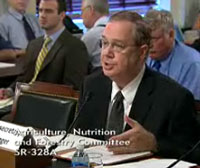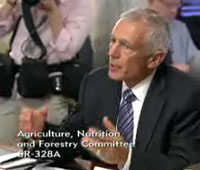Ethanol took the spotlight in a Senate Agriculture Committee hearing Wednesday on the Farm Bill’s energy and rural development programs.
 Testimony at the hearing came from USDA Undersecretary for Rural Development Dallas Tonsager, Growth Energy Co-chairman General Wesley Clark, National Alliance of Forest Owners president Dave Tenny, and New York dairy producer Eric Zuber. The discussion ranged from increasing the blend rate for ethanol, meeting targets for advanced biofuels, ethanol tax incentives and tariffs, the use of forest biomass for energy production, and methane production from livestock waste.
Testimony at the hearing came from USDA Undersecretary for Rural Development Dallas Tonsager, Growth Energy Co-chairman General Wesley Clark, National Alliance of Forest Owners president Dave Tenny, and New York dairy producer Eric Zuber. The discussion ranged from increasing the blend rate for ethanol, meeting targets for advanced biofuels, ethanol tax incentives and tariffs, the use of forest biomass for energy production, and methane production from livestock waste.
Tonsager was questioned about the Biorefinery Loan Guarantee Program of the Farm Bill and why only two loan guarantees have been granted in two years. “We’ve had 17 applications for the program, of those 10 had to be rejected because they didn’t have lenders,” said Tonsager, which is a requirement of the project and he blames that on a holding back in the private sector. As to the rest, two have been approved and they are working on others.
When questioned by Senator John Thune (R-SD) about increasing ethanol blend rate to 15 percent and delays by the EPA to made a decision on the matter, Tonsager reiterated USDA’s support of the increase and Secretary Tom Vilsack’s advocacy for it. Tonsager also said that he believes federal forest lands have potential to provide biomass for energy production, supporting the definition of renewable biomass in the Farm Bill, something that Thune advocates. “We thought the Farm Bill struck the balance and would like to see that applied to the RFS,” said Thune.
 Gen. Clark’s testimony before the committee on behalf of corn ethanol was passionate and emphatic, with his opening statement running more than twice as long as the five minutes allotted for each witness. “Today we do have a liquid fuel alternative to imported oil, and that alternative is ethanol,” said Clark, stressing that those imports cost $300 billion a year. “It’s $1000 per man, woman and child in America, every year, just so we can fill up our tanks with foreign oil.” Clark called corn-based ethanol an “incredible jewel of innovation” and expressed pride in the fact that it was developed here in the United States.
Gen. Clark’s testimony before the committee on behalf of corn ethanol was passionate and emphatic, with his opening statement running more than twice as long as the five minutes allotted for each witness. “Today we do have a liquid fuel alternative to imported oil, and that alternative is ethanol,” said Clark, stressing that those imports cost $300 billion a year. “It’s $1000 per man, woman and child in America, every year, just so we can fill up our tanks with foreign oil.” Clark called corn-based ethanol an “incredible jewel of innovation” and expressed pride in the fact that it was developed here in the United States.
Listen to or download Clark’s opening testimony here: Wesley Clark Senate Testimony
Clark was questioned about the Growth Energy “Fueling Freedom” proposal announced last week that would phase out the blenders tax credit for ethanol and redirect those dollars toward increasing infrastructure like blender pumps. “It’s a concept, not a rigid proposal, with respect to timing,” Clark said, with regard to whether the idea should be implemented by the end of this year when the tax credit expires. He also said that the proposal should be tied to an energy bill. “If we can’t pass comprehensive energy legislation, we fully support the extension of current tax policies and the extension of the secondary tariff on foreign ethanol,” said Clark, “for five years, at the current rate.”

